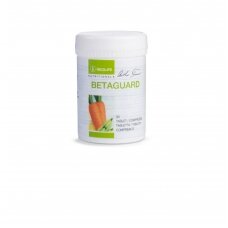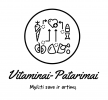„BETAGUARD“

Indoor and outdoor air causes concern
The oxygen we breathe is arguably the most important element of our environment. Without oxygen, we would die in a few minutes. Despite this fact, air is polluted by exhaust gases from cars, trucks, buses, factories, power plants. Harmful propellant gas contains hairspray, whipped cream in vials. On farms, we spray the fields with harmful, non-evaporating substances. Unfortunately, indoors the weather can be even worse. Mixtures of pollutants from outside and inside chemicals can accumulate inside modern buildings. Chemicals can evaporate from such building materials as glued plywood, wall panels, carpeting, furniture, paints and varnishes, as well as from personal care products (hair polish and nail polish remover). Other sources of pollutants – smoke from grills, cigarettes, bonfires. The risk is so high that many researchers believe that indoor contamination poses the greatest risk to our health.
Why protection from oxidative damage
- Natural, protecting nutrients, in whichmust be complementary food.
- Provides antioxidant protection to cells and tissues.
- "Catches" and destroys harmful free radicals.
- Prevents oxidative damage caused by air, water and food pollution.
Why NeoLife Betaguard?
- Wide range of protection against oxidative damage.
- Beta-carotene with vitamin E for fat-containing cells and tissues.
- Vitamin C and selenium for water-containing cells and tissues.
- Vitamin B (riboflavin, niacin and pyridoxine) can help reduce the body's unacceptable substances that enter the body by inhalation or ingestion.
- Magnesium is useful for removing toxins, restoring tissues.
- Chromium strengthens the body's defenses.
- Zinc supports the body's natural detoxification process.
- Made from natural substances in the human dietary chain, beta-carotene and other carotenoids found in carrots.
- Convenient. Easy to swallow. Easily absorbed tablets.
- Excellent addition to the Carotenoid Complex.
- Created by the world-famous toxicologist the late Dr. Arthur Furst, senior member of the NeoLife Council of scientific advisors.
DIRTY FOOD AND CONTAMINATED WATER – ANOTHER PROBLEM!
Without even knowing it, we may be drinking water contaminated with chemicals dangerous to health. Many of the products we consume contain preservatives, additives or artificial dyes. Some of them may contain residues of pesticides or other toxic substances. Research shows that some nutrients can provide the body with strong protection and strengthen the body.
NEOLIFE OFFERS BETAGUARD”
Scientific research, during which the positive effects of some substances on the body's defenses were identified, led to the creation of the NeoLife Betaguard dietary supplement. Betaguard was created by the late Dr. Arthur Furst, concerned about the amount of toxic substances in the environment. NeoLife Betaguard contains a certain amount of beta-carotene. Beta-carotene is one of the most effective natural elements that protects against oxidative damage.This substance can "catch" and destroy free oxygen radicals. This form of oxygen is a particularly active molecule that can damage the cell and cause a reaction that promotes the formation of other free radicals.
WHO NEEDS BETAGUARD?
People who smoke, live with smokers or work in a smoking room. It was observed that cigarettes and other (eg. the smoke of industrial plants, chimneys, furnaces) contains many dangerous substances, among which oxidants and free radicals are detected. In smokers or those who are in a smoking room, the body's natural defenses are under enormous strain. These people need nutrient-rich food supplements. Athletes and physically active people need more energy and oxygen than other people. Sometimes the risk of oxidation is particularly high. If you run, play tennis or engage in other active sports, your body needs ten times more oxygen than at the time you rest. With increased risk of air pollution and cell oxidation caused by increased energy use, cells need much greater protection.
"NEOLIFE BETAGUARD" - A CLEAR DIFFERENCE
NeoLife beta carotene is obtained from natural carrot oil, which in the body turns into vitamin A. Betakarotene protects the bladder and lung tissues from pollution. Betaguard contains vitamin E, a particularly strong antioxidant, which is obtained from natural plants. Recent studies show that vitamin E can protect against ozone in smog and, by reducing the effectiveness of free radicals, protects the cell membrane from oxidation. Vitamin C is a water-soluble vitamin that provides protection to all parts of cells formed from water. It is important for vitamin E recovery. Zinc protects the body from the effects of heavy metals, including mercury and cadmium. Cadmium is one of the most dangerous elements in our environment. It can inhibit the activity of many enzymes in the body. It is known that B vitamins support the body's natural ability to protect itself and eliminate many toxins. These vitamins have been shown to work well on their own and, together with vitamins C and e, promote the natural appearance of "protecting" enzymes. In addition to zinc, "Betaguard" contains selenium – an important trace element that protects the body from toxic substances of heavy metals, for example. cadmium, mercury, lead. Recent studies have confirmed the special benefits of selenium. Vitamin E, C, beta-carotene, selenium and zinc are strong antioxidant compounds. NeoLife Betaguard was designed to support the body's ability to resist the harmful effects of the environment. Such protection is necessary for all of us, and especially for those who live in cities and smoke.
BETAGUARD AND CAROTENOID COMPLEX-A POTENT ANTIOXIDANT COMPOUND WE NEED
Often, people interested in how to strengthen antioxidant protection ask: "Which of these supplements is more effective – Betaguard or Carotenoid Complex?" The answer is: they are both necessary for our diet. Both provide valuable nutrients that, interacting in different ways, provide the body with the necessary protection.
- Carotenoid Complex and Betaguard compensate for the lack of various nutrients in our food.
- Betaguard is a combination of antioxidants with synergistic properties, destroying dangerous substances in our food and maximizing protection from toxins in our environment.
- We need carotenoids, but we don't get enough of them. Each capsule of the Carotenoid Complex contains as many carotenoids as they contain in the optimal portion of fruits and vegetables. This amount helps to fill the shortage of these substances. Obviously, we need both of these dietary supplements-Betaguard and Carotenoid Complex.
Sources
- Block, G. (1991). Vitamin C and cancer prevention: the epidemiological evidence. Am J Clin Nutr. 53, 270S-282S.
- Blot, W., Li, Yu.Y. Taylor, P.R., et al. (1993). Nutrition inter-ventilation trials in Linxian, China: supplementation with specific vitamin/mineral combinations, cancer incident, and disease specific mortality in the general population. J Natl Cancer Inst. 85, 1483-1492.
- DeCosse, J.J., Miller, H.H., and Lesser, M.L. (1989).Effect of wheat fiber and vitamins C and E on rectal polyps in patients with familiar adenomatous polyposis. J Natl Cancer Inst. 81, 1290-1297.
- Fontharn, E.T.H., Coates, R. Dilley. A., et al (1992). Lung cancer in nonsmoking woman: Dietary antioxidants. Cancer Epidemiol Biomarkers Prev. 1, 250.
- Frei, B., England, L, and Ames, B.N. (1989). Ascorbic is an outstanding antioxidant in human blood plasma. Proc Natl Acad Sci U.S.A. 84, 9742-9748.
- Gridley, G., McLaughlin, J.K., Block, G., et al (1992). Vitamin supplement use and reduced risk of oral and pharyngeal cancer. Am J Epidemiol. 135, 1083-1092.
- Knekt, P., Aromaa, A, Maatela, J., et al (1991). Serum alpha-tocopherol, betacarotene, retinol, retinol-binding protein and selenium and risk of cancers of low incident in Finland. Am J Epidemiol. 134, 356-361.
- Linder, M.C. (1991). "Nutritional Biochemistry and Meta-bolism with Clinical Applications” pp. 243-246. Elsevier, New York.
- Machlin, L.J. (1991). Vitamin E. In " Handbook of Vitamins” (L.J. Machlin, ed.), 2nd Ed., pp. 99-144. Dekker, New York.
- Steinmetz, K.A., Potter, J. D., and Folsom, A. R. (1993). Vegetables, fruit and lung cancer in the Iowa women's Health Study. Cancer Res. 53, 536-543.
- van den Brandt, P. A., Goldbohm, R. A. van't Veer, P., et al. (1993). A prospective cohort study on Selenium status and the risk of lung cancer. Cancer Res. 53. 4860-4865.

 +370 679 670 37
+370 679 670 37